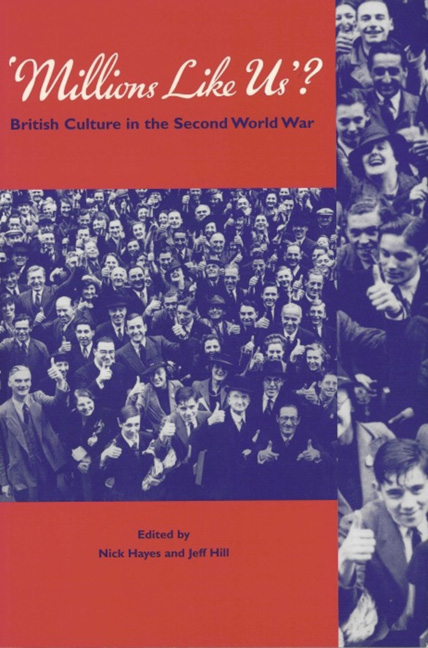Book contents
- Frontmatter
- Contents
- List of Figures and Tables
- Notes on Contributors
- Acknowledgements
- An ‘English War’, Wartime Culture and ‘Millions Like Us’
- British Cinema and ‘The People's War’
- The People's Radio: The BBC and its Audience, 1939–1945
- Was it the Mirror Wot Won it? The Development of the Tabloid Press During the Second World War
- A More Even Playing Field? Sport During and After the War
- A Time for Hard Writers: The Impact of War on Women Writers
- Safe and Sound: New Music in Wartime Britain
- More Than ‘Music-While-You-Eat’? Factory and Hostel Concerts, ‘Good Culture’ and the Workers
- ‘When Work Is Over’: Labour, Leisure and Culture in Wartime Britain
- Not Just a Case of Baths, Canteens and Rehabilitation Centres: The Second World War and the Recreational Provision of the Miners’ Welfare Commission in Coalmining Communities
- ‘You and I – All of Us Ordinary People’: Renegotiating ‘Britishness’ in Wartime
- Postscript: A War Imagined
- Index
More Than ‘Music-While-You-Eat’? Factory and Hostel Concerts, ‘Good Culture’ and the Workers
- Frontmatter
- Contents
- List of Figures and Tables
- Notes on Contributors
- Acknowledgements
- An ‘English War’, Wartime Culture and ‘Millions Like Us’
- British Cinema and ‘The People's War’
- The People's Radio: The BBC and its Audience, 1939–1945
- Was it the Mirror Wot Won it? The Development of the Tabloid Press During the Second World War
- A More Even Playing Field? Sport During and After the War
- A Time for Hard Writers: The Impact of War on Women Writers
- Safe and Sound: New Music in Wartime Britain
- More Than ‘Music-While-You-Eat’? Factory and Hostel Concerts, ‘Good Culture’ and the Workers
- ‘When Work Is Over’: Labour, Leisure and Culture in Wartime Britain
- Not Just a Case of Baths, Canteens and Rehabilitation Centres: The Second World War and the Recreational Provision of the Miners’ Welfare Commission in Coalmining Communities
- ‘You and I – All of Us Ordinary People’: Renegotiating ‘Britishness’ in Wartime
- Postscript: A War Imagined
- Index
Summary
The Second World War, Kenneth Morgan suggests, proffered a release from that ‘class-bound straight-jacket’ which handicapped the arts in Britain before 1939: the ‘people's war was generating a new people's culture, with clear radical implications’. Whatever view one takes of recent criticisms against the emergence of a popularist social radicalism generally in wartime Britain, Morgan's comments undoubtedly capture the hopes of those influential left-of-centre educational improvers seeking to transform popular cultural practice during and after the war. Nor contemporaneously was the circulation of such ideas restricted only to an inner sanctum of the chattering classes. Picture Post – perhaps the most influential popularizer of progressive opinion – regularly ran features celebrating an apparent social diffusion of the arts as it campaigned for cultural reconstruction. Beside Priestley's 1941 notorious condemnation of ‘silly, passive style’ popular amusements ran one such muscular call to battle. ‘The soul’, he prescribed, ‘demands the arts as the body demands exercise . . . . In the [new] Britain we want to build, then, there will be plenty of art of every kind’, for ‘the enjoyment of good art demands some active co-operation on the part of the audience’, and ‘plenty of opportunity’, not just for the few but also for the ‘ordinary chap’.
Two years later, in asking, ‘Are we building a new culture?’, Picture Post declared that in ‘millions of men and women a new understanding and appreciation for the arts has grown up’, part of the ‘greatest movement ever known in adult education’. As W. E. Williams (Director, Army Bureau of Current Affairs) explained, the state-sponsored Council for the Encouragement of Music and the Arts (CEMA) had ‘on an annual budget which just about buys a couple of bombers . . . instigated a wide and catholic foretaste for the arts’. Yet were Williams's and Priestley's hopes realized? Had cultures transcended class boundaries in the melting pot of war or were contemporary claims – subsequently endorsed by historians – for a newly discovered mass audience for the arts wildly exaggerated, essentially one further myth née propagandist line laid bare by wartime reality and post-war experience? Indeed, do CEMA's wartime activities warrant the label of ‘exemplary success’ still being attached to them?
- Type
- Chapter
- Information
- Millions Like Us?British Culture in the Second World War, pp. 209 - 235Publisher: Liverpool University PressPrint publication year: 1999

